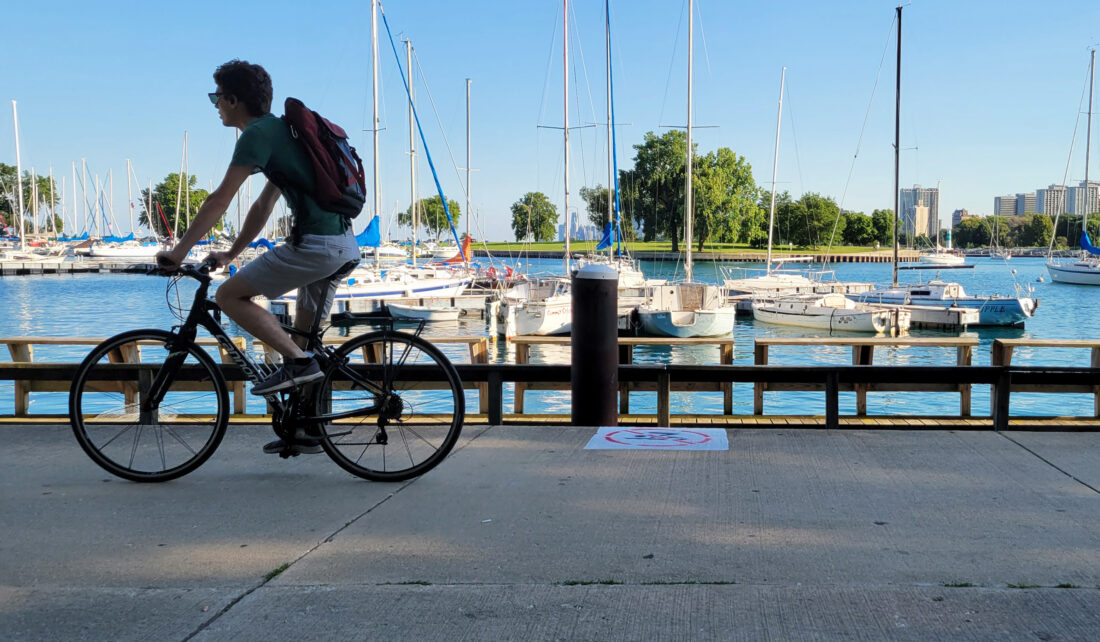
This summer, Illinois-Indiana Sea Grant (IISG) is offering an opportunity to expand knowledge of the impacts of a suite of chemicals that can be found in our homes and in the environment. PFAS, or per- and polyfluoralkyl substances, are thousands of compounds that have emerged to be a concern in the Great Lakes and Lake Champlain—they are known as “forever chemicals” due to their persistence and have been associated with health issues.
With funding from the National Sea Grant Office, we led the development of a Great Lakes region PFAS scoping process to identify and prioritize knowledge gaps and are now leading a request for proposals focused on social and economic considerations of PFAS exposure and mitigations.
Also, this summer, as part of an exciting collaboration with Shedd Aquarium and Purdue University’s Department of Forestry and Natural Resources, we are tracking fish movement in the Chicago River. We have placed 28 acoustic receiver devices in downtown waters and have implanted acoustic tags in many largemouth bass, bluegill, and common carp. Collectively, these tags and receivers will help us understand and visualize how fish in this system move in response to factors such as habitat enhancements, sewage overflow events and seasonally changing conditions.
It’s intern season at IISG and this year we have a record number. Through our long-standing internship program and the addition of the Community Engaged Internship program supported by the National Sea Grant Office, we have 12 undergraduates getting on-the-job experience and developing and honing their skills with a number of our specialists or partners.
To make the most of their experience, we also provide professional development opportunities in the form of webinars and discussions for our interns as well as other students beyond IISG to learn about practical information on careers, available resources and more.
This year is also noteworthy as it marks the return of the Shipboard Science Workshop on the EPA research ship the Lake Guardian after last year’s mechanical setbacks and the pandemic before. The 7-day workshop in early July is hosted by New York Sea Grant and will be on Lake Ontario, but it will include two teachers from Illinois, along with another 13 from New York, Michigan, Ohio and Wisconsin. During this workshop these lucky educators will work alongside Great Lakes scientists and engage in real-world research.
Educators staying on dry land have learning opportunities as well. For example, they are invited to register for our water quality workshop, organized by our education team, on July 27 at the Indiana Dunes State Park. At this one-day event, educators will learn how to collect and analyze water quality data and how to introduce this new knowledge to their students.
You can find our aquatic invasive species team this summer at the Rusty Rodeo on August 12 at Glenwood Park in St. Charles, Illinois. This family event is an opportunity to join in to help round up and remove rusty crayfish from local waterways.
And for local officials, the Indiana Land Use Summit will take place at the Hendricks County Fair Grounds on August 22. There, local planning experts will learn about the latest development trends and tools as well as have an opportunity to network and brainstorm regarding technical assistance and partnerships.
All in all, summer is a busy and exciting time for IISG. And, we look forward to engaging with many of you through our various in-person and virtual programs.
Have a great summer!
Tomas Höök
Director, Illinois-Indiana Sea Grant
Illinois-Indiana Sea Grant is a partnership between NOAA, University of Illinois Extension, and Purdue University Forestry and Natural Resources, bringing science together with communities for solutions that work. Sea Grant is a network of 34 science, education and outreach programs located in every coastal and Great Lakes state, Lake Champlain, Puerto Rico and Guam.

